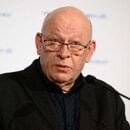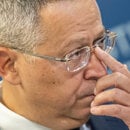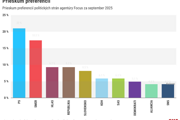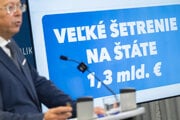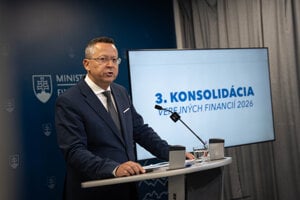JERUSALEM (Reuters) - Israeli leader Benjamin Netanyahu will visit the United States next week without meeting President Bill Clinton, an apparent signal that peace talks with the Palestinians are going nowhere fast. "For the time being no such meeting has been set," Netanyahu's office said after issuing a statement announcing he would be in Britain from Wednesday until Sunday then fly to the United States to meet Jewish groups. Israeli officials shrugged off any suggestion of tensions and blamed a simple scheduling conflict. But an Israeli official said previously that Clinton had been linking any summit to progress in peace talks. U.S. presidents routinely meet Israeli leaders on such trips. Israel receives $3 billion a year in U.S. aid, more than any other country. David Bar-Illan, Netanyahu's communications chief, said the two leaders would meet as soon as their schedules permitted. "The matter was extraneously blown out of proportion," a cabinet statement quoted Foreign Minister David Levy as saying. U.S. Secretary of State Madeleine Albright meets Netanyahu in London on Friday and Palestinian leader Yasser Arafat in Switzerland on Saturday on contentious issues left unresolved by a round of peace talks last week in the Washington area. Israeli-PLO talks have been in crisis since Netanyahu began work on a Jewish settlement in Arab East Jerusalem eight months ago. Palestinian suicide attacks that have killed 24 Israelis have deepened the stalemate. Levy was in Washington to take part in the four days of talks last week and rejected Arafat's assertion on Saturday that they achieved nothing. The talks were clouded not only by deep Palestinian mistrust of the right-wing Netanyahu but also doubts over whether Levy, widely viewed as a moderate, had a mandate to make deals. In a further sign of difficulties in U.S. Middle East peacemaking, Levy said it might be pointless for him to attend a U.S.-backed economic conference in the Gulf next week which Arab participants are threatening to boycott. "I have yet to determine a stance. We are examining whether it has a chance from a political aspect," Levy said when asked if he would head Israel's delegation to the three-day meeting in the Qatari capital Doha starting next Sunday. "There is no point travelling to Doha - with all of its importance - just to be present there," Levy told the radio. Officials said they were expecting only three other countries to be represented at the foreign minister level. The United States said last week it aimed to coax Arab states to attend the conference aimed at integrating Israel into the region. A reluctant majority, including U.S. allies Egypt and Saudi Arabia, oppose Israeli policy on peacemaking. Most Arab states view Netanyahu as the key obstacle to Arab-Israeli peace talks. Some have linked their attendance and level of participation to progress in peacemaking. Officials expect 900 business executives from around the world to attend the fourth annual conference along with Albright and other officials. Levy attended last year's Middle East and North Africa economic conference in Cairo but only for a day, insisting the meeting lacked a political dimension.
SME
Piatok, 19. september, 2025 |
Meniny má Konštantín
10. nov 1997 o 0:00
Israeli Leader Fails to Nail Down Clinton Summit
JERUSALEM (Reuters) - Israeli leader Benjamin Netanyahu will visit the United States next week without meeting President Bill Clinton, an apparent signal that peace talks with the Palestinians are going nowhere fast. "For the time being no such meeting ..
Najčítanejšie na SME
- 1 . Prieskum: PS sa vzdialilo od Smeru, Hlas klesol pod desať, do parlamentu by prešli aj Demokrati 13 303x prečítané
- 2 . Hrob je masový, ale les voňavý. Traja Česi, prezývaní dezoláti, si šli overiť vojnu na Ukrajine 5 397x prečítané
- 3 . Priehrada má problémy. Spomína sa aj v súvislosti s výstavbou vodnej megaelektrárne 4 193x prečítané
- 4 . Po oslavách Cyrila a Metoda či SNP si prišli na svoje aj farmári. Na Agrokomplex išlo 3,6 milióna Video 4 608x prečítané
- 5 . Živnostník verzus zamestnanec. Kto po Kamenického smršti zarobí viac? (prepočty) 3 219x prečítané
- 6 . Na proteste v Liptovskom Mikuláši dav prekvapil známy komik 2 843x prečítané
- 7 . VIDEO: Manchester City využil zlyhanie kapitána Neapola, hviezdny večer Rashforda Video 1 978x prečítané
- 8 . V piatok bude protestovať len bašta Smeru, na pódiu vystúpi aj známy politológ Foto 1 883x prečítané
- 1 . Postrelil a ťažko zranil zlodeja, ktorý kradol jeho majetok. Ak nezaplatí, pôjde za mreže 39 084x prečítané
- 2 . Priehrada má problémy. Spomína sa aj v súvislosti s výstavbou vodnej megaelektrárne 25 839x prečítané
- 3 . Šerif Hamran už úraduje (komentár) 20 966x prečítané
- 4 . Danko už nie je predsedom klubu SNS. Žiadny puč to nebol, vraví jeho nástupca Michelko 19 471x prečítané
- 5 . Vystupuje sa do dažďa a pri nástupe je tlačenica. Slovak Lines zmenšili stanicu na Nivách 18 002x prečítané
- 6 . Demonštranti štrajk vítajú, ale opozíciu nezjednocuje. Štrajkujúcich nebude kryť ani zákon 17 644x prečítané
- 7 . Nikto nebude dávať obraz ministerky na záchod. Rada FPU zmenila programy, ktoré podporí 17 265x prečítané
- 8 . Gajanová postúpila do semifinále. O víťazke rozhodla jediná stotina sekundy Video 15 598x prečítané
- 1. Postrelil a ťažko zranil zlodeja, ktorý kradol jeho majetok. Ak nezaplatí, pôjde za mreže 54 906
- 2. Nikto nebude dávať obraz ministerky na záchod. Rada FPU zmenila programy, ktoré podporí 40 415
- 3. Mal všetko, aby bol slávny, urobil všetko, aby pred tým utiekol. Zostal po ňom úsmev Brada Pitta Audio 39 001
- 4. Ďalší náhly koniec vo vedení daňových kriminalistov. Spustilo sa vraj aj interné prešetrovanie 38 567
- 5. Istota úpadku aj volanie po generálnom štrajku. Na protestoch sa predviedla spojená opozícia Video 35 687
- 6. Fiktívne živnosti to majú nahnuté. Čo im hrozí, keď ich inšpektor nachytá? 34 693
- 7. Odkaz z košického protestu Ficovi: Neposkladáme sa ti na luxusný život, tento zápas prehráš Video 32 615
- 8. Administratívnu budovu v centre Bratislavy zbúrajú. Nahradia ju byty 30 924
- 1 . Transakčná daň sa má platiť až od istej výšky a sviatok Sedembolestnej sa má dočasne zrušiť 128 504
- 2 . Postrelil a ťažko zranil zlodeja, ktorý kradol jeho majetok. Ak nezaplatí, pôjde za mreže 54 906
- 3 . V meste zasiahnutom žltačkou sa ľudia zabávajú na trojdňovom jarmoku, chystá sa Milénium párty 51 528
- 4 . Duchoňov najväčší hit má 50 rokov. V Terchovej už zamykajú brány, ľudia sa zmenili, tvrdí autor textu 46 764
- 5 . Domy boli podopreté, v centre bývali takmer samí Rómovia. Bola otázka času, kedy to vybuchne 45 537
- 6 . Famózna dráma, fatálne chyby. Potrestaný Weiss sedel pri novinároch, prekričal aj komentátora 42 587
- 7 . Nikto nebude dávať obraz ministerky na záchod. Rada FPU zmenila programy, ktoré podporí 40 415
- 8 . Fiktívne živnosti to majú nahnuté. Čo im hrozí, keď ich inšpektor nachytá? 39 289
Komerčné články
- Z akcie pre kolegov spravil známy moderátor úspešný biznis
- Na toto by ste sa mali vo svojej obľúbenej krčme opýtať
- Učebnica TATRA SCOOL priblíži deťom svet peňazí modernou formou
- Chcete investovať? Začína sa predaj dlhopisov pre Istropolis
- Víťaz diváckej ceny MFF Cinematik Piešťany
- Gebrüder Weiss spúšťa novú linku priamo z Prahy do Španielska
- Hodnotenie profesionála: Neďaleko Hurghady sú „egyptské Benátky“
- Od dnes len 3 dni – exotika s BUBO s 55% zľavou
- Víťaz diváckej ceny MFF Cinematik Piešťany
- Gebrüder Weiss spúšťa novú linku priamo z Prahy do Španielska
- Učebnica TATRA SCOOL priblíži deťom svet peňazí modernou formou
- Hodnotenie profesionála: Neďaleko Hurghady sú „egyptské Benátky“
- LESY SR otvorili predajňu Lesnícke pochúťky
- Z akcie pre kolegov spravil známy moderátor úspešný biznis
- Od dnes len 3 dni – exotika s BUBO s 55% zľavou
- Mars dosiahol ďalšie zníženie emisií skleníkových plynov o 1,9 %
- Toto bude cestovateľský hit roka 2026 29 371
- BUBO zverejnilo všetky termíny - exotika za polovicu 24 205
- Prekvapenie na čele. Sem budú Slováci cestovať v roku 2026 11 288
- Ľuboš Fellner otvorene 8 098
- Dvanásť tipov, kam cestovať cez jesenné prázdniny 6 012
- Plaza View v Dúbravke štartuje predpredaj bytov s výhľadom 4 340
- Takáto Čína sa bude páčiť aj Slovákom 4 224
- Cestovateľský hit desaťročí leží v Ázii – s 55% zľavou 3 694













